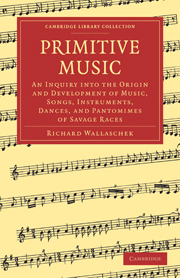 Primitive Music
Primitive Music Published online by Cambridge University Press: 29 August 2010
We have been told until tired of hearing it, that the one essential feature in primitive music was rhythm, melody being of accessory importance. We do not meet with a single instance among savages of melody, fixed according to musical principles; melodic cadences, where they occur, serve only as signals, or as a convenient accompaniment to certain activities, such as rowing, towing, or fighting. Even among savage tribes where some songs have in course of time become traditional, words and melody are varied after a few repetitions by different singers, or even by the same performer. Rhythm, taken in a general sense to include “keeping in time,” is the essence in music, in its simplest form as well as in the most skilfully elaborated fugues of modern composers. To recall a tune the rhythm must be revived first, and the melody will easily be recalled. The latter may be suggested by the former, but never vice versâ. Completely to understand a musical work ceases to be difficult when once its rhythmical arrangement is mastered; and it is through rhythmical performance and rhythmical susceptibility that musical effects are produced and perceived. From these several data I conclude that the origin of music must be sought in a rhythmical impulse in man. I do not mean that musical effects consist in rhythmical movement as such; innumerable ideas and feelings become associated with it, and give rise to those emotions which we on hearing it experience.
To save this book to your Kindle, first ensure [email protected] is added to your Approved Personal Document E-mail List under your Personal Document Settings on the Manage Your Content and Devices page of your Amazon account. Then enter the ‘name’ part of your Kindle email address below. Find out more about saving to your Kindle.
Note you can select to save to either the @free.kindle.com or @kindle.com variations. ‘@free.kindle.com’ emails are free but can only be saved to your device when it is connected to wi-fi. ‘@kindle.com’ emails can be delivered even when you are not connected to wi-fi, but note that service fees apply.
Find out more about the Kindle Personal Document Service.
To save content items to your account, please confirm that you agree to abide by our usage policies. If this is the first time you use this feature, you will be asked to authorise Cambridge Core to connect with your account. Find out more about saving content to Dropbox.
To save content items to your account, please confirm that you agree to abide by our usage policies. If this is the first time you use this feature, you will be asked to authorise Cambridge Core to connect with your account. Find out more about saving content to Google Drive.